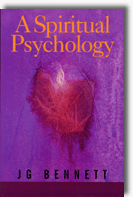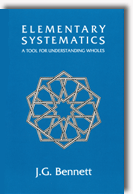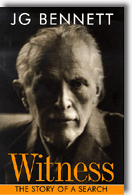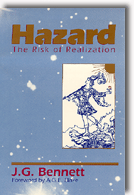Description
Paperback • 200 pages
New forewords by Charles Tart and Anthony Blake. Shortly before his death in late 1974, Bennett oversaw the final drafts for the first US edition of A Spiritual Psychology. This present book-with two new forewords by Psychology Professor Charles Tart and Philosopher/Educator Anthony Blake-is, in the fullest sense of the expression, a “workbook” for creating in oneself an independent organ of perception and an independent mode of existence-independent from the vagaries of life, both inside and out. Bennett presents here a method that owes the most to Gurdjieff but has been extended from other sources and tested by him over many years. It proved successful under his guidance at his Sherborne Academy in England, and also for people who have to work as well as they can on their own. In this “how to” psychology book, Bennett gives seasoned instruction to the reader for living a genuine spiritual life of being.
Back in print after 25 years.
J.G. Bennett=Author
Review by Pierce Butler
DESCRIPTION: The ideas in this book were first presented to the 1962 Coombe Springs summer school as themes, and much of Mr. Bennett’s explication is delivered in question and answer sessions, where his responses show the influence of Subud, recently introduced to Coombe Springs through Pak Subuh. In the first chapter, Mr. Bennett identifies his subject as transformism, which is the claim that human beings, though incomplete, have an unlimited potential. To appreciate this potential requires a spiritual psychology that takes into account all of a human being’s faculties and possibilities.
Mr. Bennett starts by defining the Material Self as connected with the physical body, fueled by automatic energy, and capable of extraordinary feats in the manipulation of external objects, but in itself, lacking sensitivity and will. On the next level is the Reactional Self, which is associated with sensitive energy and experiences the world in terms of like and dislike. The Divided Self is distinguished by the desire to make contact with others and with the world, and it works with the energy of genuine consciousness, which entails a double awareness of an observer and of what is observed. The True Self resides at the center of the human being and is capable of acting as ruler of the other selves; it is associated with the soul, which can be created to act as a sort of bridge between the realms of matter and spirit.
Soul is distinct from Spirit; there is a unique spiritual essence above the level of the True Self that bears the pattern of an individual human life and is not material in nature. But the unification of the human being depends upon the presence of Will, since it is Will that distinguishes the helpless ‘I’ from the ‘I’ that is capable of true action.
QUOTATIONS:
–“The truly spiritual development of man takes place beyond his consciousness.”
–“It is almost impossible to grasp the extent to which our notions and perceptions of space and time are dependent upon the fact that we have this kind of body.”
–“The first stage of self-knowledge is to know oneself as a machine, to see where and how this material self of ours is rightly and appropriately engaged.”
–“When the reactional self controls, it reacts without reference to any factors that are not immediately present. It is ‘heedless’ of the consequences. When the reactional self is brought under control, then its reactions turn into perceptions, and the material for understanding. Properly speaking, the reactional self should be an instrument for perception.”
–“The Divided Self is our instrument for understanding, and the use of Consciousness is to enable us to understand.”
–“The home of the ‘I’ is the true self.”
–“Egoism can mean nothing else than to put oneself in the place of God.”
–“Our search for the spiritual essence is the same as our search for conscience.”
–“The will is unified only in the man who has been transformed and who has a complete soul.”
–“Will acts upon matter and spirit so as to realize them. In doing so, it “spiritualizes matter” and “actualizes spirit.” ”
TABLE OF CONTENTS:
I. A Spiritual Psychology: the Question; institutions; transformism; Gurdjieff; spirituality; the supernatural; Buddhism; Sufism; Subud; Transcendental Meditation; kinds of spiritual action; the Fourth Way; Law of Reciprocal Maintenance.
II. The Material Self-Or Man-Machine: “Me” and “I”; properties of solid bodies; automatic energy; formation of material self; language; formatory apparatus; thought and intelligence; will.
III. The Reactional Self-Like and Dislike: sensitivity; sensitive energy; like and dislike; reaction; the role of will; functional types; habit; sensitivity and consciousness; self-remembering; Symbol of Me.
IV: The Divided Self: consciousness; desire; awareness and attention; relatedness; character and type; understanding; Gurdjieff’s centers; sensitive and conscious energies.
V: The Self and the Soul: the True Self; Spirit and Matter; Creative Energy; Gurdjieff’s Hydrogens; egoism; self and soul; body, soul, and spirit; Gurdjieff’s psychology; Sufi psychology
VI: The Spiritual Natures: soul and spirit; the Guardian Angel; fact and value; Gurdjieff’s centers; the spiritual essence; stages of mystical life; conscience; character; processes of transformation
VII: I, the Will, and the Man: unity; fact and value; will; ‘I’ and ‘me’; wish; the act; states of the soul; effort and submission.
WHO SHOULD READ:
A Spiritual Psychology will be of interest to psychologists since it attempts to add a spiritual dimension to contemporary descriptions of the psyche. Although the book is a record of a Fourth Way seminar, practitioners of Subud will be interested in Mr. Bennett’s account of the role played by the latihan in the transformation of the individual.
QUESTIONS:
–What can a spiritual psychology add to an understanding of the psyche based on contemporary analytical psychology?
–What are the functions of the different selves of the individual?
–Is there a distinction between the selves and the ‘I’ or individuality of the human being?
–What is the soul?
–What is the difference between soul and spirit?
–What is the role played by will in the unification of the individual human being?
–Do human beings have possibilities that extend beyond the material realm?
CONNECTIONS/RELATED WORKS:
Creative Thinking
Energies: Material, Vital, Cosmic
How We Do Things: The Role of Attention in Spiritual Life (Out of Print)
Making a Soul: Human Destiny and the Debt of our Existence






